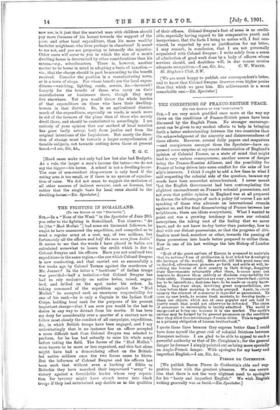THE CONDITIONS OF FRANCO-BRITISH PEACE. [To THE EDITOR OF THE
"sracr_eron.i
Srn,—I am very much gratified once more at the way my views on the conditions of Franco-British peace have been discussed by the English Press. No stronger encourage- ment can be given to my modest efforts to help in bringing
forth a better understanding between the two countries than the acknowledgment of the sincerity and disinterestedness of these efforts. However, several daily papers and magazines —and conspicuous amongst them the Spectator—have ex- pressed some surprise at my recent denunciation of England's opinion of Colonial France, as a state of mind that might lead to very serious consequences ; another source of danger being the Franco-Russian Alliance, and the possibility for France of being driven into some conflict for the sake of her ally's interests. I think I ought to add a few lines to what I
said respecting the colonial aide of the question, because my words have been somewhat misunderstood. I never meant
that the English Government had been contemplating the slightest encroachment on France's colonial possessions, and not even that public opinion in England was at all prepared to discuss the advantages of such a policy (of course I am not speaking of those who advocate an international crusade against us, and the final dismembering of France between her neighbours; there are idiots everywhere). What I wanted to point out was a growing tendency to scorn our colonial enterprises, the taking root of the feeling that we never knew, and do not know to-day better than yesterday, how to deal with our distant possessions, so that the progress of civi- lisation must lead, somehow or other, towards the passing of these possessions into hands better prepared to utilise them. Now in one of his last writings the late Bishop of London said :- " Esch of the great nations of Europe is prepared to maintain that its national form of civilisation is best fitted for developing the heritace of the world). Meanwhile; till this great issue can be decided, adventurous pioneers go forth and settle at will, in- volving the honour of their country in their doings, dragging their Governments reluctantly after them, because none can venture to disavow them entirely or disclaim responsibility for their safety. Communications are easy ; news travels fast ; action has to be immediate ; decisions have to be made on scanty know- ledge. Imp, rtant steps, involving great responsibilities, are taken before their meaning is clearly grasped. Again, in every country the interest of commerce is regarded as paramount. To open up new lands, to secure fresh markets, to develop trade,— these are objects which are at once popular and are held to justify much that could not otherwise be defended. The claim of commerce to universality is tacitly admitted. The world is recognised as being one because it is one market. The earth's surface may be farmed by its present possessors on the condition that they allow free interchange 4 commodities. This is regarded as a primary obligation of human brotherhood."
I quote these lines because they express better than I could
have done myself the great risk of colonial frictions between European nations. I am glad to be able to appeal to such a powerful authority as that of Dr. Creighton's ; for the general danger be foresaw I simply pointed out as being more specially an Anglo-French danger. With apologies for my hasty and imperfect English.—I am, Sir, Ix.,
PIERRE DE COVBEETIN.
[We publish Baron Pierre de Coubertin's able and sug- gestive letter with the greatest pleasure. We can assure
him that there is not the very slightest need to apologise for his " hasty and imperfect English." We wish English writing generally was as Incid.—En. Spectator.]


















































 Previous page
Previous page